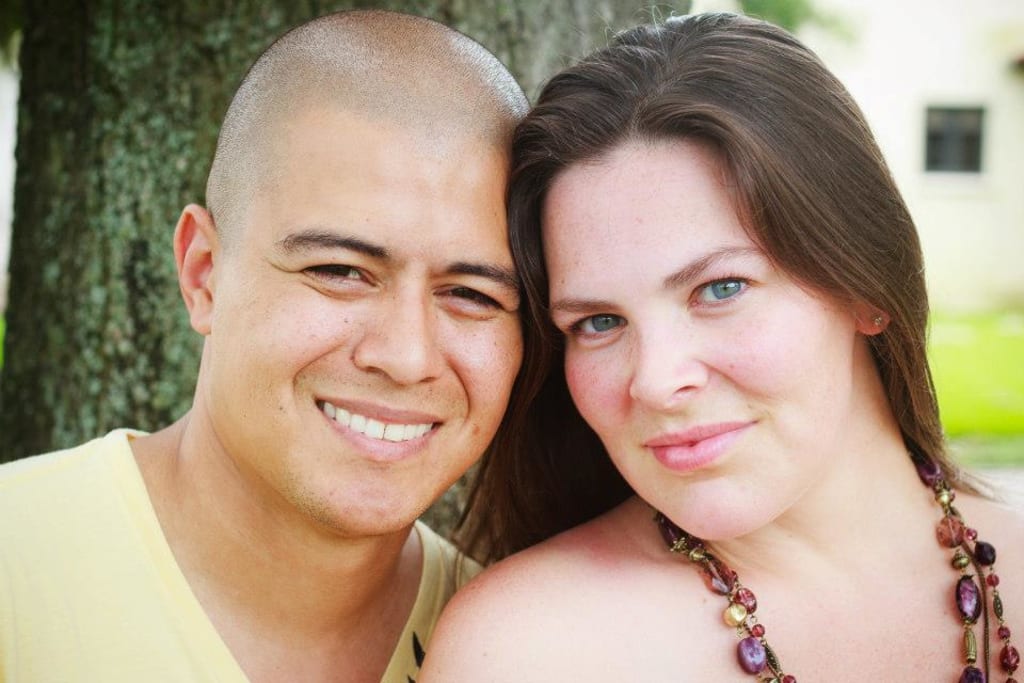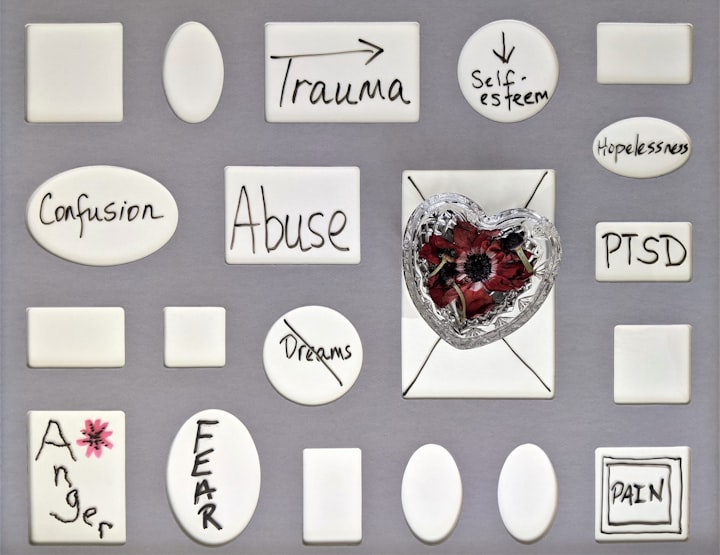The Evidence We Keep
The true story of a Marine returning from war

Ken is Puerto Rican and grew up in the Bronx. He dreamed of becoming successful and having a great job in the greatest city in the world, but when he was 14, his parents moved the family to Florida where there would be a “better environment for raising kids.” They said this in Spanish, of course. Ken’s parents did not speak English well.
Separated from his best childhood friends and with no public transportation system -- or anywhere to go -- he promptly fell into the wrong crowd. Fortunately, the oldest son of a family friend showed up one day in a crisp blue Marine Corps uniform and Ken decided he would join, too. His father, a professional wrestler in Puerto Rico, would spar with him in the ring as a kid and tell him how big and strong he was going to be one day, maybe he’d even be a Marine.
At the age of 18, Ken stood on the iconic yellow footprints at Parris Island, SC and, fulfilling his father’s dream for him, began his journey to earning the title “Marine.”
Being a Marine came naturally to a man like Ken. He was dedicated, serious, logical, and tough. He would need all of these qualities when he would be sent to military language school to learn Arabic. This strange language, he would later tell me, was mathematical and logical to learn. He quickly made linguistic connections in his brain to words and phrases in Arabic and ended up being the top performing Marine of his graduating class. Spanish and Arabic, he said, had crossed and combined hundreds of years ago when the Moors conquered Spain and this left clues and tags in modern language that he was able to grasp as a linguist.
At his first duty station he found himself in high demand. We had recently gone into the Middle East with thousands of troops, it was early 2003, and the guys on the ground needed to know what was being said around them and how to communicate with those whom they would encounter. Ken went to Iraq, worked for 7 months and came back. We had our first child. When our son was 3 months old, he was sent back to Iraq. He returned home around our son’s 1st birthday. We got pregnant again and he was sent back to Iraq. Our daughter was born and the Red Cross sent this message to the battlefield, “It’s a girl. Mom and baby are healthy.” He returned when our daughter was 6 weeks old and within the month, we were surprised to be expecting our 3rd child.
By this time, the war was moving along and was leaving Iraq where they speak Arabic and moving into Afghanistan where they speak Pashto. My Marine who had been so important for all these years, was suddenly no longer needed. He came home one day with bad news, he’d received orders for recruiting duty. For the first time in 10 years, the Marines were finally sending Arabic translators out to do other billets like recruiter duty, drill instructor duty, and embassy duty. Ken had wanted embassy duty, but he had to have been in his present rank for at least two years so he didn’t yet qualify.
It didn’t take long for the Marines to send him to recruiter school on the other side of the country for three months and leave us home alone again. Recruiters have to graduate recruiter school before they’re told where they’ll be stationed. This means that there’s no way to research where you’re going to live or to “house hunt” or to prepare at all. He received orders for a place in Florida we’d never heard of. He rented a house on his cellphone while we were driving down and the first day we laid eyes on it was the day we were moving in.
Recruiter duty is not easy. There is not a lot of “family time,” but at least he was home every night. This is when I first began pulling out that little black book and scribbling notes when he wasn’t looking.
He began waking up and laying there in pain every morning. He’d gently move his legs out of the bed and sit there unable to stand. His feet would be swollen and red. He kept medicine by the bedside saying his knees were in pain. He would finally get moving and he’d be okay. No more complaining to me. The more I asked him to see a doctor, the quieter he became about his pain. “No,” he’d tell me. “I’m too busy to go to the doctor.”
I was a veteran, too. I also thought I was too important to miss work for medical appointments and when I got out of the military and needed compensation, it was hard as nails to get because I had not medically documented my woes while I was active duty.
Why wouldn’t this man listen to me, I wondered. I chalked it up to being a Marine. And Puerto Rican. And from the Bronx.
Here’s the part where I tell you what’s supposed to happen: The Marine is supposed to go to the doctor and tell them about his pain. The doctor is supposed to order tests and determine what is wrong so the Marine can be helped. When the Marine leaves active duty service, if he has a disability, he will receive a disability check every month for the rest of his life.
Here’s what actually happened: Because we were on recruiting duty, it was not just as easy as going to the Navy hospital onbase to seek care. He would have had to find a doctor in town and the VA would have to approve it. Or he would have to drive two hours away just for a doctor’s appointment at the nearest base and for what? A couple of knee and foot pains?
Eventually the pain in his feet and knees expanded to his arms. He was exercising with the Marines one day and easily completed 20 pull-ups as he’d always done, within a month, he was only able to do 3 pull-ups. And after completing those pull-ups he was unable to lift his arms for the next week. The weakness in his arms became so pronounced that he could not help me carry baskets of laundry up the stairs or push a lawn mower. Twice he dropped our baby in the church parking lot. Once, he tumbled with her down the stairs.
He finally went to a civilian doctor when his chest pains became so pronounced that he thought he was having a heart attack. His breastbone would actually pop. He was not happy as a recruiter. There was mounting stress at home. He was failing physically and he decided it was time for him to just get out.
Ken left the Marine Corps after 13 years of faithful service. He was 7 years away from retirement. I kept scribbling my notes in that little black book. Every time he’d express pain to me, I’d write down the date and the pain. Every time he’d stop in the middle of cooking and ask me to take over because he “couldn’t stand up any longer,” I’d make a note. I had to wait for him to decide to ask the VA for disability. I had to wait for him to decide to see a doctor to find out what was wrong.
The folks at Camp Lejeune, after hearing about his pains, asked him to come back on base and let them test him. The results quickly came back, Ken had returned from one of his three tours to Iraq with a muscle disease that he did not have when he joined the military and that is not hereditary. We celebrated to know what was finally wrong. We hoped this would be easy to ask the VA for compensation since my husband was incapable of doing work to sustain our family.
We waited and watched our bank account. As soon as the VA made a decision they would respond with back pay. We’ve heard of veterans receiving 50,000 - 60,000 dollars in one swoop.
By this time, so much time had transpired, our children were in elementary school. I had been the sole breadwinner for years. We had to pay others to come do all those things around the house that a husband usually does. He was in pain all the time. Our debt was staggering.
And then, on that Tuesday morning he woke up and in our account was $20,000. The VA had determined that while his muscle disease was service connected, they had no medical appointments proving the amount of pain he was in and so they gave him 0% disability for a muscle disease he received in Iraq during war. The money that was there was for the chest pain he’d experienced all those years ago that resulted in a trip to a doctor. The chest pain was one proof of anxiety and the back pay for that small disability was $20,000.
My Marine is still dedicated, serious, logical, and tough -- even with his cane. He is 38 years old and cannot lift weights or do any muscle shredding activity because his muscles will not repair on their own. He has found a way to settle into a largely sedentary lifestyle by coaching track and basketball, not playing it. He teaches ROTC at a small private school in Georgia and 7th grade science and history. I keep thinking that things will change, administration will change, rules will change and maybe he will change. Maybe one day he will decide to tell a doctor how much pain he is in and I will have years of notes of proof written in that little black book to back him up, but until then, I’ll just keep standing by my Marine, until he can’t stand any longer.
About the Creator
Randi Cruz
Randi lives on the GA/SC line with her husband and four children. She has lived in Mexico, been in the Navy, served refugees, taught English, and traveled to Cuba. Randi loves adventure!
For Business Inquiries:






Comments
There are no comments for this story
Be the first to respond and start the conversation.